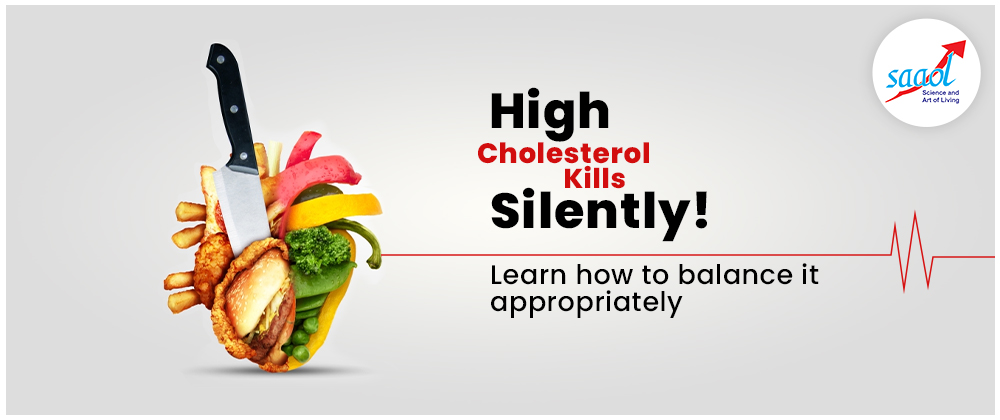High Cholesterol Kills Silently! Keep It Under Control With A Balanced Diet
SAAOL
- July 29, 2022
- 4 Min Read

High cholesterol is a silent killer that puts you at risk for heart diseases like a heart attack or stroke. Doctors across the globe have shared stories of their patients about how high cholesterol leads to a heart attack. The renowned EECP treatment center, SAAOL- Science and Art Living, has shared how including a balanced diet in one’s lifestyle can help lower cholesterol levels. But before we begin, it is important to understand “What is cholesterol and how does it impact the heart?”
What is Cholesterol?
Cholesterol is a waxy component present in your blood fats (lipids). Your body needs it to function correctly. But if you have too much cholesterol in your blood, it can build up on the walls of your arteries and form plaque. Plaque is a hard, sticky substance made up of fat, cholesterol, calcium, and other substances found in the blood. Over time, plaque can narrow the arteries and make it hard for blood to flow through them, thereby increasing the pressure on one’s heart to pump blood. This can lead to Coronary Artery Disease (CAD), Heart Attack, Stroke, and other heart problems.
When it comes to cholesterol, there are two types of fats – LDL and HDL. LDL is the “bad” cholesterol that can clog arteries and lead to heart disease. HDL is the “good” cholesterol that aids in the removal of LDL from the circulation.
The best way to lower your LDL cholesterol is to eat a healthy diet that includes plenty of fruits, vegetables, and whole grains. You should also limit your consumption of saturated and trans fats.
How Cholesterol impacts the heart?
Your liver produces cholesterol according to your body’s need. But you also get cholesterol from the food you eat, such as meat, poultry, fish, eggs, and dairy products. You can help keep your cholesterol level low by eating a healthy diet and exercising regularly. You may also need medication to treat cholesterol if it is persistently high. But before you begin with medication, a proper diet can help in reducing cholesterol levels.
Consume Healthy Fats
One key change is to consume healthy fats. This means replacing saturated and trans fats with unsaturated fats, like olive oil and avocados. Doing so can help reduce your LDL (bad) cholesterol while maintaining your HDL (good) cholesterol levels. Additionally, eating foods rich in omega-3 fatty acids can also help improve your cholesterol ratio.
Fibre
Add more fibre to your diet. It will not only help to reduce cholesterol levels, but it can also help to improve heart health and digestion. Try incorporating some high-fibre foods into your meals and snacks, such as whole grains, beans, fruits, and vegetables.
Use of functional foods
One way to control cholesterol is to incorporate more functional foods into your diet. Functional foods are foods that have been shown to have health benefits beyond their nutritional value. Some examples of functional foods include:
- Oats: Oats are rich in soluble fiber, which helps to reduce cholesterol levels by binding with it in the digestive tract. Adding oats to your diet is easy – you can enjoy them cooked as oatmeal, or add them to smoothies, yogurt, or baked goods.
- Salmon: Salmon is a rich source of omega-3 fatty acids, which have been shown to reduce inflammation and improve heart health.
- Nuts: Nuts, such as almonds and walnuts, are a good source of monounsaturated fats, which can help lower LDL cholesterol levels. Just a handful of nuts a day can make a big difference.
- Fenugreek Seeds: One natural remedy for high cholesterol is fenugreek seeds. Fenugreek is an herb that has been used for centuries in traditional medicine to treat a variety of conditions, including high cholesterol. Studies have shown that fenugreek seeds can help lower cholesterol levels by binding to bile acids and preventing their absorption into the bloodstream. Additionally, fenugreek seeds contain fiber which can help reduce LDL (bad) cholesterol levels while promoting HDL (good) cholesterol levels.
Increasing the nutritional value of food is good for your overall health. It will not only lower cholesterol levels but will also boost your immunity and strengthen you internally. Heart problems are worrisome situations because everything becomes difficult. So to prevent heart problems start taking a high nutritional diet along with a regular exercise routine that aligns with your body’s needs.
